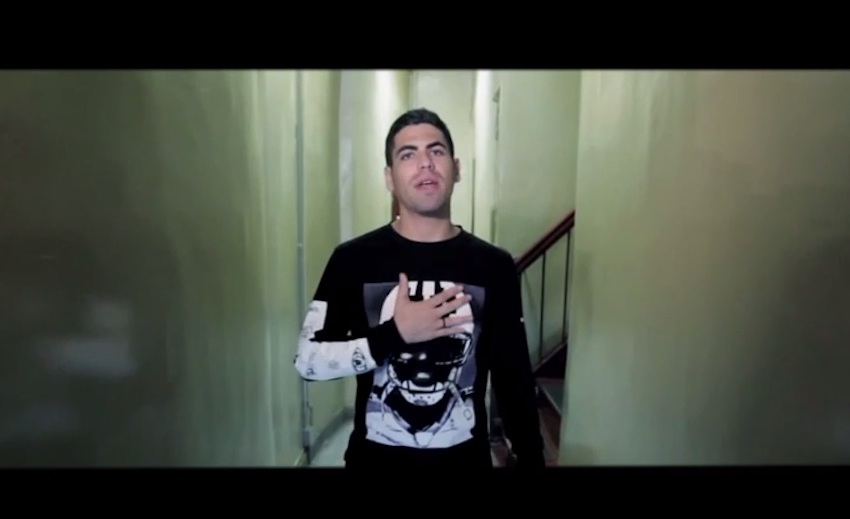‘Anita Bryant’: Rapper, Emerson Grad Comes Out In New Song
For the entirety of his musical career, emcee F. Virtue kept his life as a gay man, and life as an aspiring rapper, in two separate corners—until now.
Last week, the 23-year-old Canadian-born emcee and Emerson College grad, put out a song called “Anita Bryant” as part of his latest album We Are Not The Shame, embracing his sexuality through his music for the first time publicly.
F. Virtue, who now calls New York City home, spent five years in Boston working on his craft while at the same time keeping his true identity under wraps to avoid being rejected by the community of musicians that he strived to be a part of.
But after working on “Anita Bryant” for more than three years, F. Virtue, whose real name is William Kowall, finally felt comfortable enough in his own skin to put together lyrics about his struggle to keep his two worlds from colliding in a brazen open letter to his fan-base and hip-hop culture.
With lyrics like “Born with the sexuality backwards/and the homo strives to be a rapper,” the content of “Anita Bryant” explores a topic that has been discussed in the rap and hip-hop communities, but hasn’t been tapped into with such a heartfelt perspective and burst of emotion. The way F. Virtue has discussed his sexuality without holding back is a step forward in an ongoing battle to remove the negative connotations rappers use in their lyrics when describing homosexuality.
Through his key choice of words, the Emerson grad spews forth the reality that there aren’t many welcoming arms enveloping the gay culture in the traditional hip-hop sense, and reveals the stresses of taking on two identities to try and maintain acceptance from his musical peers. At the same time, F. Virtue shows the balancing act he had to perform on the line that divided those lives. But at some point, he knew he had to take the plunge and unearth the bit about himself that he felt he had to repress as a rapper, despite the fact that the music genre is rooted in topics that constantly talk about fighting oppression while demanding equality.
In a recent interview with Boston, F. Virtue discussed his latest song and album, in-depth, expressing why he felt compelled to come out now, and how his lyrics have been absorbed by fellow members of the hip-hop movement so far:
You’ve made a lot of music in your career, but this album delves into topics that you haven’t discussed before, specifically, your sexuality. Was it difficult to write “Anita Bryant” and make a video to go along with it?
“Anita Bryant” was a song I always knew I had to write, even years before any lyrics were actually formed. I built up the idea of writing it to a point [where] I became afraid to actually sit down to do it. It became so big, so important in my mind, that I avoided it completely—I wasn’t ready yet. First I had to be comfortable with me, then it would pen itself. And once I was, it did. That was almost three years ago. However, the video and the album “Anita Bryant” would be on, We Are Not The Shame, were a slow process with lots of obstacles [like] failed video attempts, the constant addition and subtraction of songs, and shopping it to labels. By the time planning was in place, and the video was finally made, I was comfortable, and ready.
Is this the first time you’ve come out publicly in your work?
“Anita Bryant” is the first time I’ve come out in my work. I kept my “rap life” and personal life separate for years.
Was it difficult to toggle between the two?
Jumping between the two was more difficult than you can imagine. I’d hide or ignore my boyfriend-at-the-time if he came to see me perform. Sometimes I wouldn’t even let him come because I was afraid rappers would find out. That fear leaked into my music. If you listen to my discography prior to Anita Bryant you’ll notice I avoid naming a sex, or an actual name, at all cost. In love songs, I always said “you,” never “he” or “she.” I truly was living two lives. I am thankful I no longer have to. Having nothing to hide is everything.
Why release “Anita Bryant” now?
As I mentioned before, it was written years ago. But I released it now because the pieces were in place. I had a checklist. I was good with who I was. I had finally come out to everyone I worked with. I met the perfect director for the project through a magazine I was writing for. And most importantly, the world was open to it thanks to the progress we’ve made in recent years. From Frank Ocean to Mykki Blanco to Macklemore, there’s been a lot of doors opened.
You mention in your lyrics that you wonder how people—including your DJ—would react to this song. How have people within the hip-hop community reacted to it so far?
That was part of my checklist. It was dominoes, and each person I told prepared me for the next. Initially, I came out to my immediate Fameless Fam, including my homie and acclaimed video director, Ricky Shabazz. When I eventually told DJ Emoh, and he was so damn cool with it, I was almost there. The last person I wanted to tell before I came out publicly was J57 from Brown Bag AllStars who I had worked with for years. We were collaborating on an EP, Trill Cunningham, and I wanted to tell him before it was released out of fear that if he found out and was ashamed he would be embarrassed of having done a project with me. What a stupid thought, what a destructive scenario to imagine. He was entirely supportive, he was proud. I realized everyone I told in my circle was more than accepting. It wasn’t an issue. That love gave me the power to truly do me. Since [then], there hasn’t been any hate towards me from the hip-hop community. Keep it up, world!
Knowing there was that acceptance, overall, what’re your thoughts on where the line between hip-hop and homosexuality is going?
I think the global view on homosexuality in general is changing for the better. I don’t like to consider it in hip-hop as sexuality isn’t something to consider in such a way. Gay artists will continue to create, just as straight artists will, along with everything in between. Nothing will stop that. The line will blur and, one day, it will simply be musicians making music. And that’s it. We still aren’t there, but we’re getting closer. “Anita Bryant” [the song] helps. “Green Lantern” helps. And it’s all to get us to a point in society where things don’t help, they just are.
Do you hope this song helps other kids that may be struggling with self acceptance, possibly inspiring them to be proud of who they are?
Yes! Of course! I wrote it because I felt alone in junior high. I remember being bummed when some of my favorite rappers put being gay down with lyrics. Blueprint, someone I respect despite the verse, once said, “Who’s the gay rapper, it’s probably you.” Like it’s an insult. To make the sting worse, it was on a crew cut with some of my heroes, so I listened to the track often, despite that line making me cringe. I needed a hip-hop song, by an honest [emcee], about my situation. Something I could relate to. I hope I made that for kids. My ultimate goal is for them not to feel alone. Not to hate themselves. This idea is encompassing of all my music. Not sexuality, but the feeling of loving who you are, improving, discovering and the lifting [off] of weights.
Besides you coming out to the rap world, what makes this album different than your past efforts?
Well, it’s obviously the most personal! This is my 13th studio album, and it’s nothing like the previous baker’s dozen. Before I write, or make a beat, I have a theme in mind. Every album tells a story. Following Wild is about the duality of nature and invention in each person. “Never Made It To O’Briens” deals with the solitude I experienced while I was depressed and being a hermit in a room with substances. While “We Are Not The Shame” is a look at my relationships, with myself, my history, my friends, and crushes.
Anything else you want to say about your career?
I’ve started producing and writing the next record and it has a very special sound. I’m looking forward to the future. For all of us.
Below is the video for “Anita Bryant,” off of F. Virtue’s latest album We Are Not the Shame, on Fake Four records:



